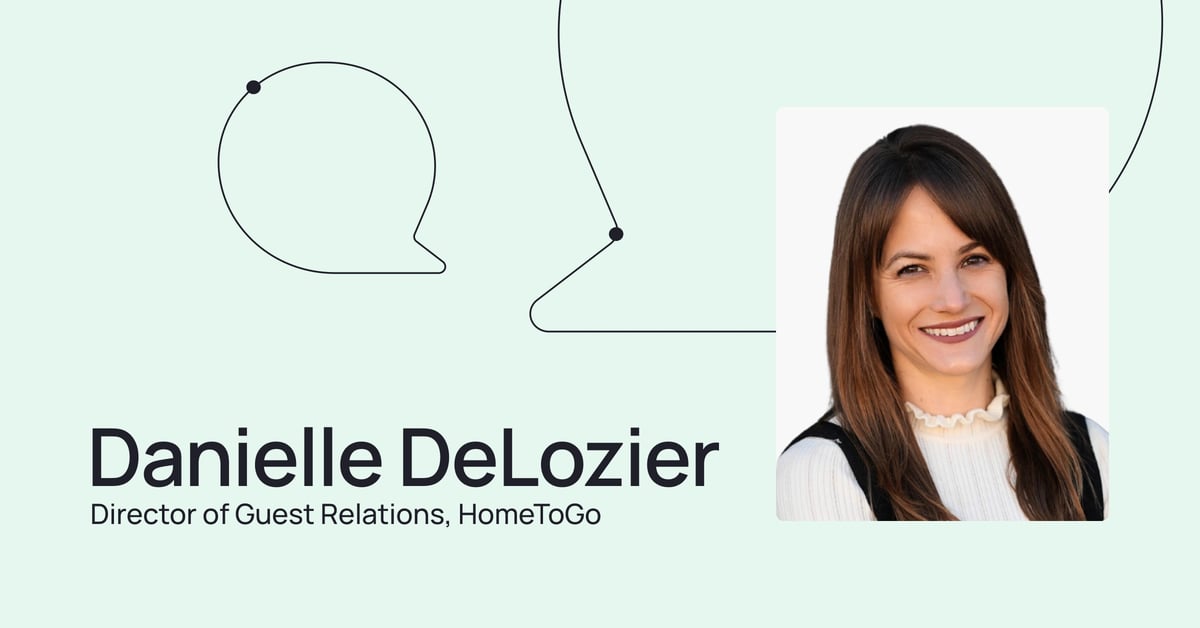Here, we’ll bring you tips and learnings from leading CX voices around the world. First up: Danielle DeLozier, the Director of Guest Relations at HomeToGo, one of our valued customers.
Q. How did you get into customer support, and what inspired you to stay?
I’ve had a pretty unique path into customer support! My background is in tech and I started my career in a corporate leadership program. This exposed me to different tech domains, and I found I thrived in technical hands-on teams that had a direct impact on end users.
I led Salesforce implementations for many years, and began leading the global Service Cloud rollout for Michelin in 2017, as part of their digital transformation program.
“It was there I became obsessed with the idea that in today’s world, experience is the single most important factor in customer retention.”
In September 2021, I officially transitioned from tech into customer service when I was promoted to the role of Guest Relations Director at HomeToGo.
Q. What factors have led to higher customer expectations in the past year?
I think the competitive landscape has driven this change. Even if you’re unique in your industry and are only competing with 1-2 other companies, your customers are likely to interact with brands that have revolutionized CX.
Then you’ve also had companies solving problems in new ways — instead of buying a car and having it sit in your parking spot 90% of the time, you can use one on an as-needed basis. These shifts have led to a universal rise in customer expectations.
Q. Speaking to aspiring CX leaders out there and looking at yourself before your career skyrocketed, what advice would you give them/yourself?
1. Always keep learning. CX is a new and rapidly changing field — one you can both learn from and contribute to. Constantly evaluate experiences that you have as a consumer with other brands, observe what different companies are doing, and read up on various methodologies and ideologies in the field.
2. Have goals but be open to how you get there. Great CX skills are needed in so many departments and organizations, from customer support to marketing to product. If you’re passionate about CX, be open to where you may find the best fit. The best things in my career have come from experiences that I was never planning on but completely open to.
3. Step away from your laptop. You need creativity, passion and inspiration to create great experiences. You need to be experiencing the world to deliver these same emotions, connections, and outcomes for your customers.
“I find new ideas when I’m doing things I love like traveling, running, or simply talking with friends, not while I’m in front of my laptop.”
Q. Looking back, what was the biggest challenge you faced that changed the way you look at CX and how did you overcome it?
I struggle to find the best way to experiment and try new concepts within our team. Coming from the enterprise tech space, I was used to matching customer requirements with existing platforms, then building out new features to fill the gaps.
In CX, you only have a loose framework of ideals and methodologies that you then need to apply in a way that’s relevant to your company and your customers. You don’t always know the right answer, and some experiments may fail — but you can incorporate those learnings into future iterations to become even better.
We are constantly working on processes that help us experiment, and learn faster and more efficiently.
Q. 65% of customers want to buy from companies offering easy online transactions, suggesting a rising demand for better CX. How does HomeToGo adapt to these higher customer expectations while still providing empathic customer care?
We continually review, discuss, and share the voice of our guests throughout our organization, and incorporate new learnings on guest behavior into our service. Covid changed the needs and concerns of our guests overnight, and we recognize that in this “living with covid” world, travel has a specific and unique meaning for every guest.
So when you contact us, we don’t just solve your case but rather enable your vacation. Whether you’re seeing your at-risk parents for the first time in two years, or restarting your annual girls weekend, we take time to ensure that we understand your question and provide the right solution.
We do that efficiently using tools like Service Cloud to accelerate routine tasks like collecting and finding information.
Read more insights from voices in CX
Q. With asynchronous messaging becoming more of a must than a trend, how would you leverage automation to build long-lasting relationships with customers?
By enabling things like 24x7 messaging channels, guided actions for repetitive tasks, and virtual agents, we give our human agents more time to connect with our guests. Plus, we can leverage guest, property, and partner information to create more personalized communication.
“While automation can be associated with a loss of personalization, we see the opposite being true. It actually gives us new capabilities for further building out relationships with our guests.”
Automated chat and asynchronous messaging allows us to be available at all hours of the day and still collect guest inquiries even at non-peak hours of our day.
Q. Some organizations are still hesitant when it comes to including AI technology in scaling customer support. How do you change internal processes or drive organizational change to focus (or even consider) automation?
I think this, in fact, is the most challenging part of implementing technical change. In order to find the right solutions, you need to lead with a business benefit, a process-oriented approach — instead of the other way around.
I would really encourage teams to take their top business problem and analyze it from a customer’s point of view. By doing so, they can truly understand pain points and areas for improvement. Only then should they start considering support automation as well.
